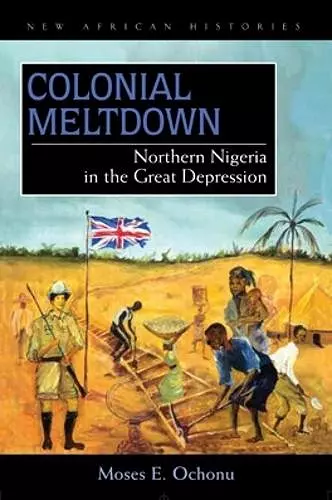Colonial Meltdown
Northern Nigeria in the Great Depression
Format:Paperback
Publisher:Ohio University Press
Published:15th Sep '09
Currently unavailable, and unfortunately no date known when it will be back
This paperback is available in another edition too:
- Hardback£69.00(9780821418895)

Historians of colonial Africa have largely regarded the decade of the Great Depression as a period of intense exploitation and colonial inactivity. In Colonial Meltdown, Moses E. Ochonu challenges this conventional interpretation by mapping the determined, at times violent, yet instructive responses of Northern Nigeria’s chiefs, farmers, laborers, artisans, women, traders, and embryonic elites to the British colonial mismanagement of the Great Depression. Colonial Meltdown explores the unraveling of British colonial power at a moment of global economic crisis.
Ochonu shows that the economic downturn made colonial exploitation all but impossible and that this dearth of profits and surpluses frustrated the colonial administration which then authorized a brutal regime of grassroots exactions and invasive intrusions. The outcomes were as harsh for Northern Nigerians as those of colonial exploitation in boom years.
Northern Nigerians confronted colonial economic recovery measures and their agents with a variety of strategies. Colonial Meltdown analyzes how farmers, women, laborers, laid-off tin miners, and NorthernNigeria’s emergent elite challenged and rebelled against colonial economic recovery schemes with evasive trickery, defiance, strategic acts of revenge, and criminal self-help and, in the process, exposed the weak underbelly of the colonial system.
Combined with the economic and political paralysis of colonial bureaucrats in the face of crisis, these African responses underlined the fundamental weakness of the colonial state, the brittleness of its economicmission, and the limits of colonial coercion and violence. This atmosphere of colonial collapse emboldened critics of colonial policies who went on to craft the rhetorical terms on which the anticolonial struggle of the post–World War II period was fought out.
In the current climate of global economic anxieties, Ochonu’s analysis will enrich discussions on the transnational ramifications of economic downturns. It will also challenge the pervasive narrative of imperial economic success.
“Colonial Meltdown is a must read for scholars and students interested in Northern Nigeria, the Depression, taxation, and the colonial state.…In very accessible prose, supported by meticulous research, (Ochonu) argues convincingly that the collapsing produce prices and dwindling profits of the Great Depression created a distinctive moment in the history of colonial exploitation in Northern Nigeria….” * Journal of African History *
“(Colonial Meltdown) presents a persuasive argument that the paralysis of the colonial authorities in the face of unprecedented devastation in Northern Nigerian villages and communities resulted in the undermining of colonial paternalism.” * The American Historical Review *
”Colonial Meltdown presents an informative, well-argued and largely persuasive historical narrative that invites further, comparative investigation of the impact of the great depression on colonial economies, as well as offering a detailed case study which Nigeria scholars will find particularly valuable for its focus on a relatively understudied area.” * Journal of Colonialism and Colonial History *
“This book is well researched, elegantly written, and bound to reshape the debate on British imperialism in Africa.” * author of Work and Control in a Peasant Economy *
“Ochonu argues eloquently that the Depression was a period of manifest colonial failure which saw the withdrawal of many rural Nigerians from the global economy.” * The Journal of Imperial and Commonwealth History *
“Altogether, (Colonial Meltdown) is a solid historical analysis with deep insight into the contradictions of the colonial enterprise in nonemirate colonial Northern Nigeria. More important, it provides important signposts for understanding some of the structural antecedents to Nigeria’s problematic postcolonial developmental state.” * African Studies Review *
“While previous African historians such as Fred Cooper have revealed the integral efforts of African workers’ resistance during the interwar period, as part and parcel of the decline of the colonial era, Ochonu shifts the timeline to argue that scholars may need to look earlier to the Depression years to seek the catalysts of later anti-colonial struggles.” * Alpata: A Journal of History *
“Ochonu has written a widely ranging and richly detailed history of how colonial officials and Northern Nigerians responded to the economic and political challenges posed by the Great Depression.” * International Journal of African Historical Studies *
ISBN: 9780821418901
Dimensions: unknown
Weight: unknown
272 pages